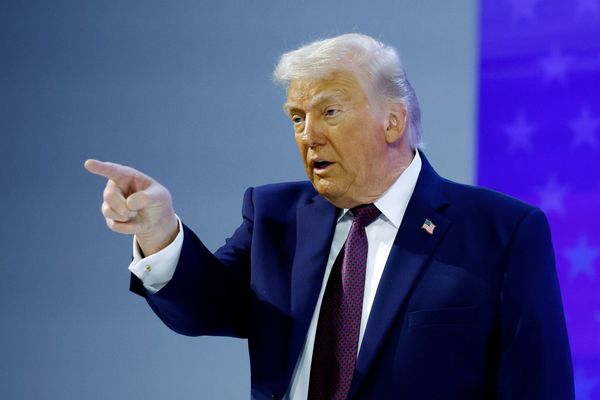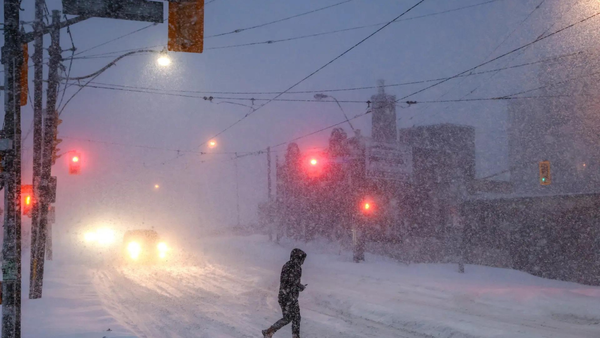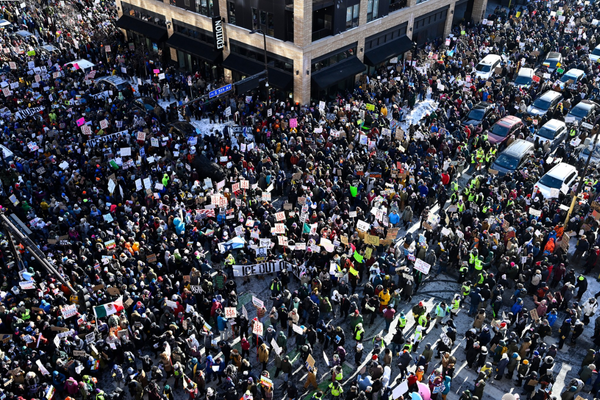The Justice Department's criminal probe of ex-spy chief John Brennan hit a big roadblock after Director of National Intelligence Tulsi Gabbard withdrew the security clearances of potential witnesses who could have testified against him, four Trump administration officials tell Axios.
Why it matters: The witnesses, officials say, are key to prosecutors' efforts to prove that Brennan inappropriately biased a bombshell 2017 intelligence assessment about Russia favoring Donald Trump, and that he allegedly lied about it to Congress in 2023.
- Brennan, a former CIA director, has denied any wrongdoing.
Driving the news: The Brennan investigation hit a snag after Gabbard announced on Aug. 19 that she was revoking the security clearances of 37 "current and former intelligence professionals who have abused the public trust by politicizing and manipulating intelligence" and "leaking classified intelligence without authorization."
- Many of them were involved in the Russia probe.
- Nearly a dozen were on the witness list against Brennan — including those who objected in 2017 to putting the discredited "Steele Dossier" in the intelligence report Brennan had quarterbacked.
- That assessment said Russian President Vladimir Putin had a "clear preference" for Trump in the 2016 election.
Friction point: When Gabbard's office canceled the security clearances, it didn't give a heads-up to the Justice Department or David Metcalf, the federal prosecutor in charge of investigating Brennan.
- "Some of these people are my witnesses and this is going to make it really difficult to prosecute now," Metcalf told a senior administration official, according to a source with direct knowledge of the conversation.
- "It's a major complication ... a self-inflicted wound," a second official said. "It's an unforced error if you want to talk baseball, an own goal if you want to use soccer."
Axios' sources said there were three problems created by cancelling the security clearances:
- It could be harder for prosecutors to discuss classified matters with the witnesses.
- Witnesses would be less willing to cooperate out of anger with the government that besmirched their names.
- Brennan's defense lawyers could attack their credibility by citing Gabbard's claims they had "betray[ed] their oath to the Constitution" and "abused the public trust."
What they're saying: A senior intelligence official disputed the notion the case is severely damaged. The official said the witnesses could still testify even after their clearances had been revoked, which happened during the Afghan War Commission investigation.
- "The clearance gives you only the ability to see new material. It doesn't ... require you to forget what's already in your head, or ... allow/prevent you from talking to someone about what you know. That's based on the recipient's clearance and need to know, not whether you hold a clearance," the official said.
- "If DOJ has the legal right to ask about what the interviewee knows, then the interviewee's clearance status is irrelevant."
- "The Department of Justice is committed to collaborating with ODNI to end the weaponization of the intelligence community and justice system after years of abuse," a DOJ spokesperson said in a written statement.
The big picture: The controversy underscores the ongoing tension between Gabbard's office and other departments as she makes sweeping changes to the intelligence community.
- "Tulsi is the right person for the job with the wrong team," a senior administration official said. "They've treated this like a PR operation to get on Fox, and not a serious intel reform process envisioned by the president."
- The Wall Street Journal reported last month that Gabbard "blindsided" the CIA with the cancellation list that included an active undercover officer. Her office disputed the report and said the CIA had been notified.
- The Guardian reported Saturday that Gabbard's office hadn't told the White House in advance, which Gabbard's team also disputed. Regardless, the Justice Department wasn't notified in advance. Gabbard's team says other agencies had ample time to weigh in.
- The notification from Gabbard's office was emailed to agencies on Aug. 18 at 7 p.m., after work hours. Gabbard publicly announced the security clearance cancellations the next day, at 3:53 p.m.
Trump and his allies have waged a six-year battle against the so-called "deep state," trying to prove that the Russia investigation, culminating with the Mueller Report in 2019, was unfair.
- On July 2, CIA Director John Ratcliffe released a "tradecraft" review that criticized Brennan over the process used to assemble the Trump-Russia intelligence assessment in 2017.
- On July 8, Fox News reported Brennan was under federal investigation along with former FBI Director James Comey, who also denies wrongdoing.
- On July 23, Gabbard declassified and released a 2020 House Permanent Select Committee on Intelligence report that disputed the conclusions of the Brennan-backed assessment.
The other side: Democrats and supporters of intelligence community professionals say Trump is trying to rewrite history and misconstruing the evidence.
- A 2020 Senate Intelligence Committee report found Russia interfered in the 2016 election to help Trump.
- The Durham Report, released in 2023, harshly criticized the FBI but found no criminal wrongdoing by Comey or Brennan, who nevertheless was chided for appearing to over-hype Trump's ties to Russia.
Reality check: The multiple reports that found varying degrees of Russian preference for Trump make it "really hard" to bring a criminal case against Brennan, administration sources acknowledged.
- Mark Zaid, a Trump administration critic who represents six of the intelligence professionals whose clearances were revoked, said administration officials fretting about the Brennan case have "valid concerns."
- "This seems to be, as usual, an unforced error by Trump administration officials who don't think things through in the long game in favor of a quick-pass completion," he said.
- "If I were the defense counsel [for Brennan], I would raise the revocation in an attempt to undermine the credibility of the witnesses."
What's next: Administration officials say the investigation isn't dead yet — and doesn't have to result in indictments of Brennan or Comey.
- A federal grand jury could issue a report without indictment, they said.
- "Wouldn't we, as a nation, want to know that there is another side of the story and that people were lied to?" one of the officials said.
This story was updated with a comment from the Justice Department.






